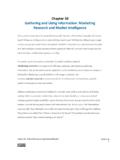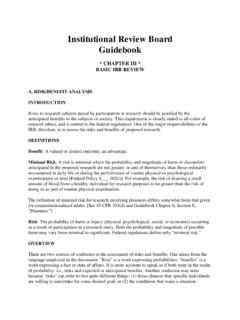Transcription of Archaic Greece - Saylor
1 Archaic Greece1 Archaic GreeceThe Archaic period in Greece (800 BC 480 BC) is a period of ancient Greek history that followed the GreekDark Ages. This period saw the rise of the polis and the founding of colonies , as well as the first inklings of classicalphilosophy, theatre in the form of tragedies performed during Dionysia, and written poetry, which appeared with thereintroduction of the written language, lost during the Dark Ages. The term Archaic covers these cultural aspects termini of the Archaic period are defined as the "structural revolution", meaning a sudden upsurge of populationand material goods, which occurred c.
2 750 BC, and the "intellectual revolution" of classical Greece .[1] The end ofarchaism is conventionally defined as Xerxes' invasion of Greece in 480 sharp rise in population at the start of the Archaic period brought with it the settlement of new towns and theexpansion of the older population centres. The Archaic period is also characterized by the spread of colonizationalong the Mediterranean and Black Sea coasts that began about 800 The reason for this phenomenon isdescribed by Greek authors as stenochoria, "the lack of land", but in practice there were a great number of reasons:rivalry between political groups, the need for adventure, expatriation, the search for trade opportunities and so on.
3 [2]EtymologyThe term Archaic describes things belonging to ancient times and is derived from the Greek word archaikos whichmeans primitive.[3] This term arose from the study of Greek art, where it mainly refers to styles of surface decorationand sculpture, placing it chronologically between geometric art and the classical Greek art. In the sense that itcontained the seeds of classical art, it is considered " Archaic ". Modern historians think of the term Archaic as amisnomer.[4] The Archaic period in Greek history is considered to be one of the most fruitful periods of Greekhistory.
4 [5]Crisis and consolidation of the polisMycenaean Greece of the Bronze Age had been divided into kingdoms each containing a territory and a populationdistributed into both small towns and large estates owned by the nobility. The kingdom was ruled by a king claimingauthority under divine right by descent from a heroic ancestor and physically established at a palace situated within acitadel, or acropolis. During the Greek Dark Ages the palaces, kings and estates vanished, population declined,towns were abandoned or became villages situated in ruins and government devolved on minor officials and thetribal the middle of the 8th Century the societal structure of Greece had come under immense pressure and the poliswas at risk of collapse.
5 Three distinct stressors developed for each strata of Archaic society. By 750 thesestressors became impossible to reconcile due to an explosive growth of population in Greece , about 4% per three factors were in many ways connected and tended to reinforce one another.[6]The farmers of Greece lived under a susbsistence lifestyle and were frequently subject to crop failures. Hesiod writesof many different circumstances that could befall an Archaic greek farmer, all of which would force him to borrowgoods from his neighbors. Failure to pay back these goods could lead to loss of the farm, debt, or enslavement of thepeople affected.
6 Due to the sharp increase in population, arable farmland, which had always been scarce, nowbecame insufficient to support all the people in Greece . 750-600 in Greece was marked by widespread 600 almost all of the farmers in Athens had been dispossessed of their property and worked as slaves on aristoi, aristocratic familes, were in constantly competing against one another to gain territory, money, or status. The elegant clothes, jewelry, pottery, artworks etc. from the Archaic period were by and large made to the tastes of this part of greek society. Aristoi in the Archaic period existed in a closed community of symposion, festivals, lavishArchaic Greece2meals, and athletic games that had nothing to do with the commonwealth or farmers of Greece .
7 However an aristoi'sstatus was predicated on his wealth - if he were to lose it he would also lose his nobility. The advent of sea traderoutes placed the aristoi at risk of losing everything through failed overseas investements. [6]The commonwealth the aristoi governered were repeatedly drawn in to the conflicts of the aristoi as soldiers,disrupting their lives with every new power struggle between nobles. They levied much critcism at the aristoi forneglecting the farmers and at the extravagant lifestyle which the nobility led. As overseas trade become morecommon in Greece some commoners found themselves very wealthy.
8 Increasingly the newly rich common peoplechallenged the authority of the aristoi, posing a political threat to their regional monarchies.[6]Reaction 1: ColonizationAs a reaction to the overpopulation, economic problems and rising political tension within Greece , between 750 600 many Greeks from all parts of Greece left mainland Greece by ship to establish new colonies . Somecolonists went freely to escape the current tensions in Greece and some were sent there as exiles. Any givenexpedition consisted of about 100-200 people, mostly young men and was led by a Greek noble, searching to gainmore power and wealth outside of Greece .
9 A citizen who left Greece to go to one of these colonies gave up hiscitizenship in Greece in exchange for citizenship in the new colonies were widespread, creating greek settlements in Southern Italy, Sicily, Sardinia, Corsica, the southcoast of what is now France, around the coast of the Black Sea, and Cyprus, to name a few. These colonies were notprovinces of the polei from which they came but independent cities entirely, who traced their heritage back to amother polis within Greece proper. Relations between colonist Greeks and the indigenous populations of thecountries they governed were mixed - some cultures met in harmony and others were conquered and enslaved by theGreeks.
10 An important consequence of Greek colonization was the spread of Greek culture, religion, and designthroughout the mediterranean, including sites that would come to great importance later in history.[6]Reaction 2: TyrantsThe exceptional success of the move to colonize the rest of the Mediterranean happened in harmony with aconsolidation of the Greek polis into a cohesive city-state with social and political order. This process was howeverfrequently interrupted between the 6th and 7th centuries by numerous aristocrats. These tyrants, a greek wordmeaning 'unrightful ruler' tended to set up a dictatorship within the polis, raise an army, and attack other polei in abid to extend their influence.












